Characteristics of the Qur’an
Bismillah walhamdulillahi Rabbil ‘Alameen, was Salaatu was Salaatu ‘alaa Ashrafil Anbiyaa’i wal Mursaleen.
عن النواس بن سمعان رضي الله عنه قال: سمعت رسول الله صلى الله عليه وسلم يقول:
”يؤتى يوم القيامة بالقرآن وأهله الذين كانو يعملون به في الدنيا تقدمه سورة البقرة وآل عمران تحاجان عن صاحبهما ”
رواه مسلم
An-Nawwas bin Sam`an (May Allah be pleased with him) reported: I heard the Messenger of Allah sal Allahu alayhi wa sallam saying, “The Qur’an and its people who applied it, will be brought on the Day of Resurrection preceded with Surat Al-Baqarah and Surat Al-`Imran arguing on behalf of their companions.” (Muslim)
May Allah ta’ala make us amongst the people of the Qur’an, Ameen.
This page is dedicated to studying and learning the Characteristics of the Qur’an. Just as we cannot love Allah, His Messenger or His deen without having knowledge of them, we also cannot love the Book of Allah or act upon it without knowing its qualities.
Qur’anic Characteristic #1:
عن النواس بن سمعان رضي الله عنه قال: سمعت رسول الله صلى الله عليه وسلم يقول:
”يؤتى يوم القيامة بالقرآن وأهله الذين كانو يعملون به في الدنيا تقدمه سورة البقرة وآل عمران تحاجان عن صاحبهما ”
رواه مسلم
An-Nawwas bin Sam`an (May Allah be pleased with him) reported: I heard the Messenger of Allah sal Allahu alayhi wa sallam saying, “The Qur’an and its people who applied it, will be brought on the Day of Resurrection preceded with Surat Al-Baqarah and Surat Al-`Imran arguing on behalf of their companions.” (Muslim)
May Allah ta’ala make us amongst the people of the Qur’an, Ameen.
This page is dedicated to studying and learning the Characteristics of the Qur’an. Just as we cannot love Allah, His Messenger or His deen without having knowledge of them, we also cannot love the Book of Allah or act upon it without knowing its qualities.
Qur’anic Characteristic #1:
Quran is Al Hakeem
Allahumma ija’lnaa min ashaabil Qur’an, O Allah, make us among the companions of the Qur’an. Ameen.
The first characteristic of the Qur’an that we will share is: Al Hakeem.
Allah ta’ala says in Surah Yaseen ayah 2:
وَالْقُرْآنِ الْحَكِيمِ
By the Qur’an, full of wisdom!
....Click Here To Read More....
Allah ta’ala swears by the Qur’an in this verse, which is known as a ‘qasm’ in Arabic. In the Qur’an, Allah ta’ala swears by many things, showing the importance and honor of the object.
Allah ta’ala is honoring the Qur’an by taking a qasm by it, and when Allah ta’ala swears an oath, we know what that whatever comes after (jawaab qasm) is very important. And what is the characteristic (sifah) of the Qur’an mentioned? Al-Hakeem, full of wisdom. This Qur’an is not an ordinary book, but it is Hakeem. Hakeem is from ha kaaf meem, and hikmah means: wad’u shayyin fee muhalihi, to place something where it belongs. How is the Qur’an Hakeem? There are three meanings of Hakeem:
Haakim: The Qur’an is decisive and conclusive. The Qur’an has the final decision.
Dhoo Hikmah: Full of wisdom, in three ways. Firstly, wisdom in its content and rulings. They are according to the fitrah (human nature) and they are what mankind needs. The rulings in the Qur’an are according to the intellect–they just make sense. Secondly, wisdom in its order and arrangement. And thirdly, wisdom in its style. We can derive oceans of meaning just from a few words (remember Ni’mah?) There is so much wisdom in the Qur’an, that even if we tried, we would never be able to grasp all of it. That’s why there is never an end to studying the Qur’an.
Muhkim: The Qur’an is firm and perfect in strength and meanings. Nothing can change it or attack it.
So if the Qur’an is Hakeem, full of wisdom in so many ways, then it is worthy of being followed.
Qur’anic Characteristic #2:
Quran is Qayyiman
May Allah make us among the companions of the Qur’an, Ameen.
Qur’anic Characteristic #2 is: Qayyiman.
Allah ta’ala begins suratul Kahf:
الْحَمْدُ لِلَّهِ الَّذِي أَنْزَلَ عَلَىٰ عَبْدِهِ الْكِتَابَ وَلَمْ يَجْعَلْ لَهُ عِوَجًا
قَيِّمًا لِيُنْذِرَ بَأْسًا شَدِيدًا مِنْ لَدُنْهُ وَيُبَشِّرَ الْمُؤْمِنِينَ الَّذِينَ يَعْمَلُونَ الصَّالِحَاتِ أَنَّ لَهُمْ أَجْرًا حَسَنًا
All the praises and thanks be to Allah, Who has sent down to His slave the Book (the Quran), and has not placed therein any crookedness. It is straight to give warning of a severe punishment from Him, and to give glad tidings to the believers, who work righteous deeds, that they shall have a fair reward. (18:1-2)
Allah ta’ala says about the Qur’an: <<وَلَمْ يَجْعَلْ لَهُ عِوَجًا>> , and He did not make therein any crookedness. The word for crookedness is عِوَجًا, ewajaa, from ayn wow jeem and this is an amazing word. It means crookedness or deviance in something. Ewaj is used for something that has been bent. There are two words from this root of ayn wow jeem:
1st one is ‘ewaj, which is conceptual or intangible crookedness. It’s the type of crookedness that someone has in their character, when they are not behaving “straight” or “normal”.
2nd word is ‘awaj. And this means something that was straight, but became crooked. This type of crookedness is very easy and obvious to notice.
Allah azza wa jal uses the first word in the ayah, ‘ewaj, not ‘awaj. This means that the Qur’an has no crooked information, not even the slightest form. Subhan Allah, this first ayah is negating ANY fault whatsoever in the Qu’ran.
How is the Qur’an not crooked? There is no distortion amongst the verses, the words are just as Allah revealed them. The Qur’an has been preserved by writing, by memorization to the point that we even know HOW the Prophet sal Allahu alayhi wa sallam recited the Qur’an…each word, each letter, even each syllable! There is no deviation in the teachings or the information, there is no contradiction in it, and there is nothing in the Qur’an contrary to the truth.
The first ayah negates any fault, and this second ayah confirms what the Qur’an really is: Qayyiman, one completely straight. Qayyiman is from qaaf wow meem or qaum, and this means to stand. Remember this definition: Qayyiman is one that IS straight and LEADS to that which is straight.
The Qur’an is Qayyiman in 3 ways:
It is Mustaqeem: One that is straight.
It is Mu’tadil: One that is balanced.
It stands firm for the benefit of people. Its commands are a source of benefit.
Why is the Qur’an Qayyiman? <<لِيُنْذِرَ بَأْسًا شَدِيدًا مِنْ لَدُنْهُ>>, so as to warn of a severe punishment from near Him. يُنْذِرَ, yunthira is from noon thaal ra, nathr and this means to warn. Nathr is to give news that arouses fear, and has an effect on the person. So when one hears a warning, they should become fearful and seek to change.The warning is of: <<بَأْسًا شَدِيدًا>>, ba’san shadeedan, a severe punishment. Ba’san is from ba hamza seen and it literally means violence, difficulty and also power/might. Shadeedan is from sheen daal daal and it means something that is severe. This ba’san shadeedan is referring to the Hellfire, which is severely harsh and violent to those who enter it. There are so many in this world who do not know of the Qur’an, and this is a reminder for the believers to spread the message of the Qur’an and to be fearful themselves of the punishment of Hellfire.
One of the ways the Qur’an is qayyiman is because its mu’tadil (balanced). We can see this when Allah ta’ala says, <<وَيُبَشِّرَ الْمُؤْمِنِينَ الَّذِينَ يَعْمَلُونَ الصَّالِحَاتِ أَنَّ لَهُمْ أَجْرًا حَسَنًا>> and to give glad tidings to the believers, those who work righteous deeds that for them is a good reward.
Qur’anic Characteristic #3:
Quran is Full of Dhikr
Characteristic of the Qur’an:In one of the most beautiful beginnings of the Qur’an, Allah ta’ala starts surah Saad with a powerful reminder. He says:
ص ۚ وَالْقُرْآنِ ذِي الذِّكْرِ
Saad. And by the Qur’an, full of dhikr! [Surah Saad, verse 1]
This ayah begins with a letter, which are known as: huroof muqatta’aat, the disjointed letters. There are many opinions as to what these letters mean, but the greatest and strongest opinion is that none but Allah ta’ala knows their meanings.
So this surah, with the first letter, has already set the tone with a powerful beginning. Then Allah ta’ala says: “and by the Qur’an, full of dhikr!” If you notice the letter ‘wow’, it shows that Allah is swearing and taking an oath by the Qur’an which is called a ‘qasm’ in Arabic, which is why the translation is “and by”.
What is this Qur’an? ذِي الذِّكْرِdhi dhikr, full of dhikr. the word ‘dhi’ means possessor, one that contains, one that owns something. So what does the Qur’an own, contain and possess? adh-Dhikr. This is one of the names of the Qur’an, and gives multiple interpretations. There is a reason why this word has not be translated yet in this post, it is because this word in this context has several meanings:
Firstly, dhikr here means “tadhkeer” (تذكير), a reminder. What does the Qur’an remind of? It reminds us of reality of life and of our duties and obligations.
Secondly, dhikr here means “maw’idhah” (موعظة), admonition. A maw’idhah is an advice or instruction, but not just any advice, this advice is effective and pushes a person to do good deeds and to abstain from disobedience.
Thirdly, dhikr here means a bayyaan (بيان) ‘a mention, explanation’. What does the Qur’an mention? The nations of the past, ahkaam (rulings) and future events as well.
Lastly, dhikr here means sharaf (شرف), honor. The Qur’an, by its mention, is a source of honor for those who accept. The one who mentions the Qur’an is honored as well as the Qur’an itself is honorable.
So this Qur’an is dhi dhikr: possessor and owner of reminder, admonition, advice and honor. SubhanAllah, absolute completeness. This ayah is a response to the pagans of Makkah who said, we wish we had a dhikr from the former people! Allah responds, this is the Qur’an, dhi dhikr.
Have you sought out the dhikr today? May Allah ta’ala make us companions of the Qur’an, Ameen.
and Allah ta’ala knows best.
Here is the next
Quran is Mubaarak
The next Characteristic of the Qur’an is Mubaarak.
Allah subhanahu wa ta’ala says in Surah Saad verse 29,كِتَابٌ أَنْزَلْنَاهُ إِلَيْكَ مُبَارَكٌ لِيَدَّبَّرُوا آيَاتِهِ
Allah subhanahu wa ta’ala says in Surah Saad verse 29,كِتَابٌ أَنْزَلْنَاهُ إِلَيْكَ مُبَارَكٌ لِيَدَّبَّرُوا آيَاتِهِ
وَلِيَتَذَكَّرَ أُولُو الأَلْبَاب
“(This is) a Mubaarak Book which We have sent down to you, that they may reflect upon its signs, and that men of understanding may remember.” (Saad: 38:29)
Mubaarak is that which is full of barakah. And barakah is from the root, ba ra kaaf (ب ر ك), and barakah is that which lasts long and has the ability to increase. When something is Mubaarak, it includes three meanings:
It is a source of katheerul khayr, full of goodness. So Mubaarak is that which has a lot of good and is where unexpected and expected good is received.
Source of katheerul fawaa’id, a lot of benefits.
That which is thaabit, firm and has continuity. The blessings one receives from it is firm, it is not a temporary benefit but has permanence.
So how is the Qur’an Mubaarak? Let’s look at all three of these meanings:
the Qur’an is a source of katheerul khayr: it is a guidance and mercy for the believers, it gives the news of Jannah, it is a healing, it contains commandments that guide us, it is a light, it is an admonition and advice from Allah, and it is a source of reward (10 rewards per letter).
the Qur’an is a source of katheerul fawaa’id: it benefits in both this life and the next. In this dunya it is a furqaan for us-the criterion between right and wrong, it increases one in knowledge and it is a source of protection. In the aakhirah, it is a means to ascend to the highest levels of Jannah (hadeeth: iqra’ war taqi, read and ascend!), it an intercessor and shade for its companions, and it will accompany its readers in the grave.
the Qur’an contains firm, continuous and permanent blessings: the Rabb Who revealed it is Blessed, the Prophet it was revealed to is blessed (alayhi salaatu wa salaam), the month it was revealed in is blessed, the night it was sent down in is blessed, the city it was revealed in is blessed, those who store it in their heart are blessed, those who learn it are blessed and those who teach it are blessed.
So ask yourself: am I missing out on this Mubaarak Book? Have you tasted some of its goodness, benefits and blessings?
may Allah ta’ala make us among the companions of the Qur’an, Ameen.
Qur’anic Characteristic #5:
“(This is) a Mubaarak Book which We have sent down to you, that they may reflect upon its signs, and that men of understanding may remember.” (Saad: 38:29)
Mubaarak is that which is full of barakah. And barakah is from the root, ba ra kaaf (ب ر ك), and barakah is that which lasts long and has the ability to increase. When something is Mubaarak, it includes three meanings:
It is a source of katheerul khayr, full of goodness. So Mubaarak is that which has a lot of good and is where unexpected and expected good is received.
Source of katheerul fawaa’id, a lot of benefits.
That which is thaabit, firm and has continuity. The blessings one receives from it is firm, it is not a temporary benefit but has permanence.
So how is the Qur’an Mubaarak? Let’s look at all three of these meanings:
the Qur’an is a source of katheerul khayr: it is a guidance and mercy for the believers, it gives the news of Jannah, it is a healing, it contains commandments that guide us, it is a light, it is an admonition and advice from Allah, and it is a source of reward (10 rewards per letter).
the Qur’an is a source of katheerul fawaa’id: it benefits in both this life and the next. In this dunya it is a furqaan for us-the criterion between right and wrong, it increases one in knowledge and it is a source of protection. In the aakhirah, it is a means to ascend to the highest levels of Jannah (hadeeth: iqra’ war taqi, read and ascend!), it an intercessor and shade for its companions, and it will accompany its readers in the grave.
the Qur’an contains firm, continuous and permanent blessings: the Rabb Who revealed it is Blessed, the Prophet it was revealed to is blessed (alayhi salaatu wa salaam), the month it was revealed in is blessed, the night it was sent down in is blessed, the city it was revealed in is blessed, those who store it in their heart are blessed, those who learn it are blessed and those who teach it are blessed.
So ask yourself: am I missing out on this Mubaarak Book? Have you tasted some of its goodness, benefits and blessings?
may Allah ta’ala make us among the companions of the Qur’an, Ameen.
Qur’anic Characteristic #5:
Quran is Mubeen
The next characteristic of the Qur’an is Mubeen.
“Al Kitaabil Mubeen” appears many times in the Qur’an at the beginning of surahs after the huroof muqatt’aat (disjointed letters).
الر ۚ تِلْكَ آيَاتُ الْكِتَابِ الْمُبِينِ Alif-laam-ra. These are the ayaat of the “Mubeen” Book. (12:1)
الر ۚ تِلْكَ آيَاتُ الْكِتَابِ وَقُرْآنٍ مُبِينٍ Alif-laam-ra. These are the ayaat of the Book, and a “Mubeen” Qur’an. (15:1)
طس ۚ تِلْكَ آيَاتُ الْقُرْآنِ وَكِتَابٍ مُبِينٍ Ta-Seen. These are the ayaat of the Qur’an, and a book that is “Mubeen.” (27:1)
طسم تِلْكَ آيَاتُ الْكِتَابِ الْمُبِينِ Ta-Seen-Meem. These are the ayaat of the “Mubeen” Book. (28:1-2)
حم وَالْكِتَابِ الْمُبِينِ “Ha-meem. And by the “Mubeen” Book!. (43:1-2) (this ayah is a qasm/an oath)
حم وَالْكِتَابِ الْمُبِينِ “Ha-meem. And by the “Mubeen” Book!. (44:1-2) (this ayah is a qasm/an oath)
When Allah ta’ala repeats something so many times in His Speech, then we know there is a reason for the repetition and importance in what is being repeated.
What does it mean that the Qur’an is “Mubeen”?
Mubeen is from the root ba-ya-noon (ب ي ن ), bayn. And this root has three meanings:
Any type of distance.
That which is far (bu’ud, بعد)
Something that is clear (waadih, bayaan, واضح، بيان)
Something that is clear is far in resemblance to the other.
This Qur’an is Mubeen, it is clear and far from anything else in resemblance. The name Mubeen implies two meanings:
That which is clear in itself. The Qur’an is clear in its content and in its understanding.
That which clarifies the other. The Qur’an clarifies truth from falsehood, guidance from misguidance, the believers from the disbelievers, and it clarifies the mind of a person.
The Qur’an is a bayyinah, a clear proof. Everything that is stated in this Qur’an is based on bayyinah: the ilm of Allah azza wa jal. In other words, this Kitaab is authentic. There is nothing like it, it is unique, clear, comprehensive and profound in its meaning.
May Allah azza wa jal make us companions of Qur’anil Mubeen, Ameen.
“Al Kitaabil Mubeen” appears many times in the Qur’an at the beginning of surahs after the huroof muqatt’aat (disjointed letters).
الر ۚ تِلْكَ آيَاتُ الْكِتَابِ الْمُبِينِ Alif-laam-ra. These are the ayaat of the “Mubeen” Book. (12:1)
الر ۚ تِلْكَ آيَاتُ الْكِتَابِ وَقُرْآنٍ مُبِينٍ Alif-laam-ra. These are the ayaat of the Book, and a “Mubeen” Qur’an. (15:1)
طس ۚ تِلْكَ آيَاتُ الْقُرْآنِ وَكِتَابٍ مُبِينٍ Ta-Seen. These are the ayaat of the Qur’an, and a book that is “Mubeen.” (27:1)
طسم تِلْكَ آيَاتُ الْكِتَابِ الْمُبِينِ Ta-Seen-Meem. These are the ayaat of the “Mubeen” Book. (28:1-2)
حم وَالْكِتَابِ الْمُبِينِ “Ha-meem. And by the “Mubeen” Book!. (43:1-2) (this ayah is a qasm/an oath)
حم وَالْكِتَابِ الْمُبِينِ “Ha-meem. And by the “Mubeen” Book!. (44:1-2) (this ayah is a qasm/an oath)
When Allah ta’ala repeats something so many times in His Speech, then we know there is a reason for the repetition and importance in what is being repeated.
What does it mean that the Qur’an is “Mubeen”?
Mubeen is from the root ba-ya-noon (ب ي ن ), bayn. And this root has three meanings:
Any type of distance.
That which is far (bu’ud, بعد)
Something that is clear (waadih, bayaan, واضح، بيان)
Something that is clear is far in resemblance to the other.
This Qur’an is Mubeen, it is clear and far from anything else in resemblance. The name Mubeen implies two meanings:
That which is clear in itself. The Qur’an is clear in its content and in its understanding.
That which clarifies the other. The Qur’an clarifies truth from falsehood, guidance from misguidance, the believers from the disbelievers, and it clarifies the mind of a person.
The Qur’an is a bayyinah, a clear proof. Everything that is stated in this Qur’an is based on bayyinah: the ilm of Allah azza wa jal. In other words, this Kitaab is authentic. There is nothing like it, it is unique, clear, comprehensive and profound in its meaning.
May Allah azza wa jal make us companions of Qur’anil Mubeen, Ameen.
Qur’anic Characteristic #6:
Quran is Majeed
Allah ta’ala says in the first ayah of Surah Qaaf,
ق ۚ وَالْقُرْآنِ الْمَجِيدِ
“Qaaf. By the Qur’an that is Majeed” (50:1)
Majeed is from the root meem-jeem-daal (م ج د), majd. Majeed means: dhul majd: one that has majd. Majd is complete ‘athamah (sovereignty) and sultaan (authority). From the root, it is said: majdatul ibl, “the camel reached a vast land”. This gives us the meaning that majd is wus’ah, vastness and spaciousness. Majeed means vastness in greatness, in glory, in might, in honor and in respect.
How is the Qur’an Majeed?
1- It has ‘atheemah, great status. Allah has given it the highest status of all the books sent down.
2- It is a Muhaymin over all previous books. Muhaymin means one who guards and looks after. The Qur’an is authoritative and corrects the mistakes done by the people in the previous books.
3- It is Haakim (One that Judges), not Mahkoom (one that is judged). It is Naasikh (one that abrogates), not Mansookh (one that is abrogated). Over it nothing else can be preferred.
4- It has the khayr (goodness) of dunya and aakhirah.
The Qur’an is Majeed: exalted, very honorable, respected, perfect, complete, high status and of great might.
ق ۚ وَالْقُرْآنِ الْمَجِيدِ
“Qaaf. By the Qur’an that is Majeed” (50:1)
Majeed is from the root meem-jeem-daal (م ج د), majd. Majeed means: dhul majd: one that has majd. Majd is complete ‘athamah (sovereignty) and sultaan (authority). From the root, it is said: majdatul ibl, “the camel reached a vast land”. This gives us the meaning that majd is wus’ah, vastness and spaciousness. Majeed means vastness in greatness, in glory, in might, in honor and in respect.
How is the Qur’an Majeed?
1- It has ‘atheemah, great status. Allah has given it the highest status of all the books sent down.
2- It is a Muhaymin over all previous books. Muhaymin means one who guards and looks after. The Qur’an is authoritative and corrects the mistakes done by the people in the previous books.
3- It is Haakim (One that Judges), not Mahkoom (one that is judged). It is Naasikh (one that abrogates), not Mansookh (one that is abrogated). Over it nothing else can be preferred.
4- It has the khayr (goodness) of dunya and aakhirah.
The Qur’an is Majeed: exalted, very honorable, respected, perfect, complete, high status and of great might.
Qur’anic Characteristic #7:
Quran is Kareem
Allah ta’ala says in Suratul Waaqi’ah:
وَإِنَّهُ لَقَسَمٌ لَّوْ تَعْلَمُونَ عَظِيمٌ
And that is indeed a mighty oath if you but knew,-(56:76)
What is this magnificent oath that Allah azza wa jal has taken?
إِنَّهُ لَقُرْآنٌ كَرِيمٌ
That this is indeed a Qur’an, Kareem. (56:77)
Kareem is from kaaf-ra-meem and karam is used for a grape vine. A grape vine looks very beautiful and brings a lot of benefit. When Kareem is used for Allah: it means Allah ta’ala is very generous and He is of high status. When kareem is used for a person, it means they are very honorable and hold a great position as well as they have character. When kareem is used for speech, it means a word that is gentle, good, humble and beneficial.
When used for Qur’an, Kareem means:
1- This Qur’an that is very beneficial, full of blessings, katheerun naf’, full of benefits. Every letter brings you reward, every reading brings you a new lesson.
2-This Qur’an which is honorable. Honored by who? By Allah azza wa jal, it is Allah’s Kalaam–the most honored Kalaam with an exalted status.
This Qur’an is Kareem: it changes hearts and guides a person to action, it shows people the reality of life and the reality of the hereafter.
Imam Sa’di rahimahullah states in his tafseer that Kareem means: katheerul khayr, containing every good and every type of knowledge. It is a book that if one seeks to benefit from, they will.
This is a Kareem book, revealed by Al Kareem, to a messenger that is Kareem for us…Yet what have we done with it?
by Amatullah
Taken from: http://tayyibaat.wordpress.com/
Qur’anic Characteristic #4:







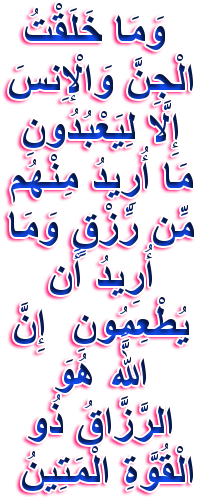
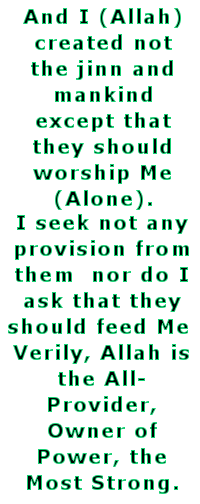
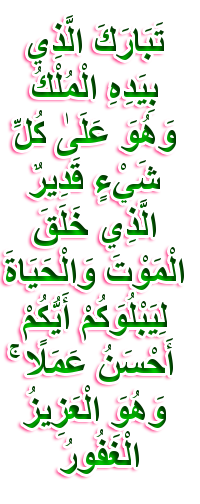












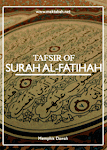


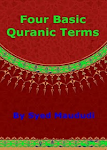











0 comments:
Post a Comment